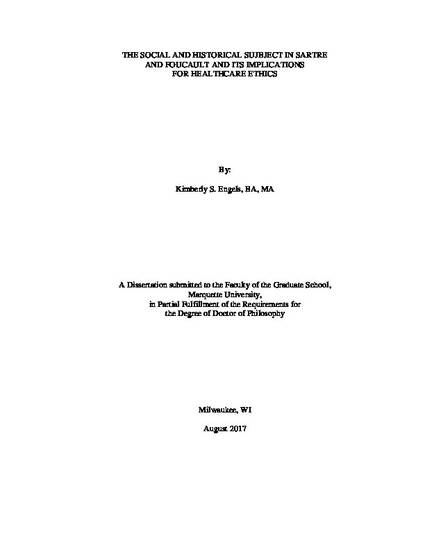
This dissertation explores Jean Paul Sartre’s and Michel Foucault’s view that subjectivity is socially and historically constituted. Additionally, it explores their corresponding ethical thought and how these viewpoints can be applied to ethical issues in the delivery of healthcare. Sartre and Foucault both hold the view that human beings as subjects are not just participants or spectators in social practices, rather, they become subjects with ontological possibilities through their interaction with these practices. In Chapter One, I trace Sartre’s views on subjectivity in his two major works Being and Nothingness and The Critique of Dialectical Reason, Volume 1, showing how he argues that we are constituted as subjects through a dialectical interaction of consciously intended praxis with the reified results of human affairs, or practico-inert. In Chapter Two, I trace Foucault’s views on the subject through all three periods of his career, and show how he argues that we are constituted as subjects through systems of thought, strategies of power, and practices of the self. I specifically differentiate the views of each philosopher from those of the more traditional moral philosophers Immanuel Kant and John Stuart Mill, who view the subject as self-determining and ahistorical. In Chapter Three, I examine each thinker’s later lectures on ethics, and show that each philosopher presents an outline for an ethical mode of being, which I call “ethical subjectivity.” For both philosophers, ethical subjectivity requires critical historical reflection, ethics as an ongoing task, and innovation. In Chapters Four and Five, I use Sartre’s and Foucault’s views on subjectivity and ethics to analyze two contemporary issues in healthcare ethics: conscience-based refusals and mandatory HPV vaccination. Through discussion of these two issues, I show how focusing on the social, historical, material dimensions of how we become who we are introduces a different starting point for analysis and leads to a unique discussion in contrast to the ethical approaches rooted in the thought of Kant or Mill.
Available at: http://works.bepress.com/kimberly-engels/11/
